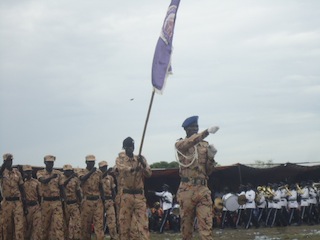Jonglei joins South Sudan in commemoration of martyrs day
July 30, 2013 (BOR) – Hundreds of people gathered in Bor, the capital of Jonglei state, to commemorate the late South Sudanese leader John Garang, who died in a helicopter crash while returning from Uganda on July 30, 2005.

Under the landmark deal, Garang was sworn in as Sudan’s first vice president under president Omar Hassan Al-Bashir. When Garang visited Khartoum ahead of his inauguration a huge number of people turned out to greet him.
However, after 21 years in bush fighting Sudan government, Garang spent just 21 days in office, as the vice president of Sudan and the president of the semi-autonomous region of South Sudan, before is death.
Since then July 30 was made national martyrs day and has been celebrated annually, first by the regional government and then since South Sudan gained independence in 2011.
The minister of cabinet and parliamentary affairs, Gabriel Gai, the acting governor, told the gathering to lead a peaceful life in the state as the name of Jonglei state had become synonymous with tribal clashes and upheaval since separation from Sudan.
Gai called for the “people of Jonglei state join hands as brothers’ and sisters of one state to work for unity and prosperity the state”.
The minister said that an external agenda was driving David Yauyau’s rebellion in Pibor county. Juba accuses neighbouring Sudan of backing the rebel group, an allegation denied by Khartoum.
Gai told the gathering that the Sudan People Liberation Arm (SPLA) – the former rebels who now form South Sudan’s army – will soon deal with Yauyau’s rebel group.
“Those who continue to shed blood of innocent people will account for the lives of those who died for the sake of peace during the wars of liberation”.
Referring to president Salva Kiir’s recent decision to sack his deputy Riek Machar and his entire cabinet, the minister called on people not to involve themselves in national politics, warning that current political developments in Juba may be misunderstood.
He pointed out that the president has a constitutional mandate “to reshuffle his government whenever the need arises” and replace his vice president.
Gai, like Machar. is from the Nuer tribe, South Sudan’s second largest ethnic group after the Dinka.
DISABLED WAR VETERANS
South Sudan has forgotten about those who were disabled and lost their limbs in the civil war that led to independence, according of former captain in the SPLA, who is now a MP representing the disabled, widows and orphans.
Deng Ajang said that the government has been doing its best to see cater for the needs of disabled soldiers and former combatants but limited resources, rampant Insecurity and lack of development remain challenges.
“It is difficult for those with amputated legs to get an access for them to go to their artificial limbs, the blind and the deaf have no environment for them to exercises their energy and knowledge they have to put it into practices such that they also participated in the national development”, Ajang explained.
According to figures obtained from the South Sudan war disabled widows,
orphans commission, South Sudan has 83,672 registered war disabled, out of
which 22,036 are from Jonglei state.
The country has 51,145 widows, with 15,145 living in Jonglei, while there are officially 197,735 orphans nationwide, of which 54,516 were citizens of Jonglei state.
(ST)
